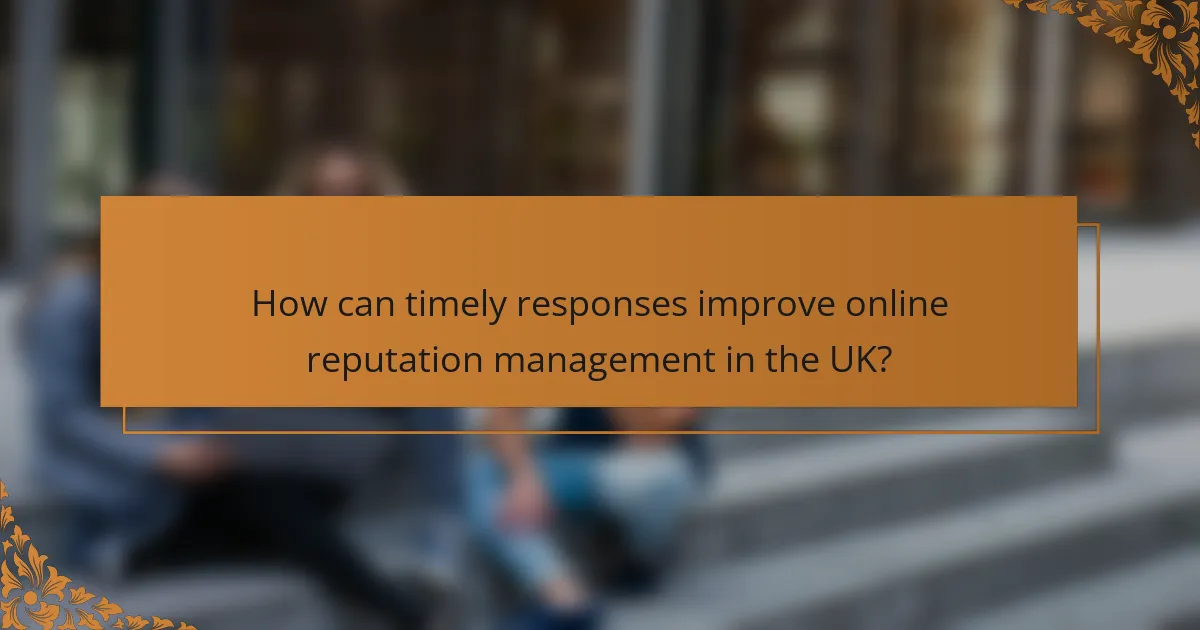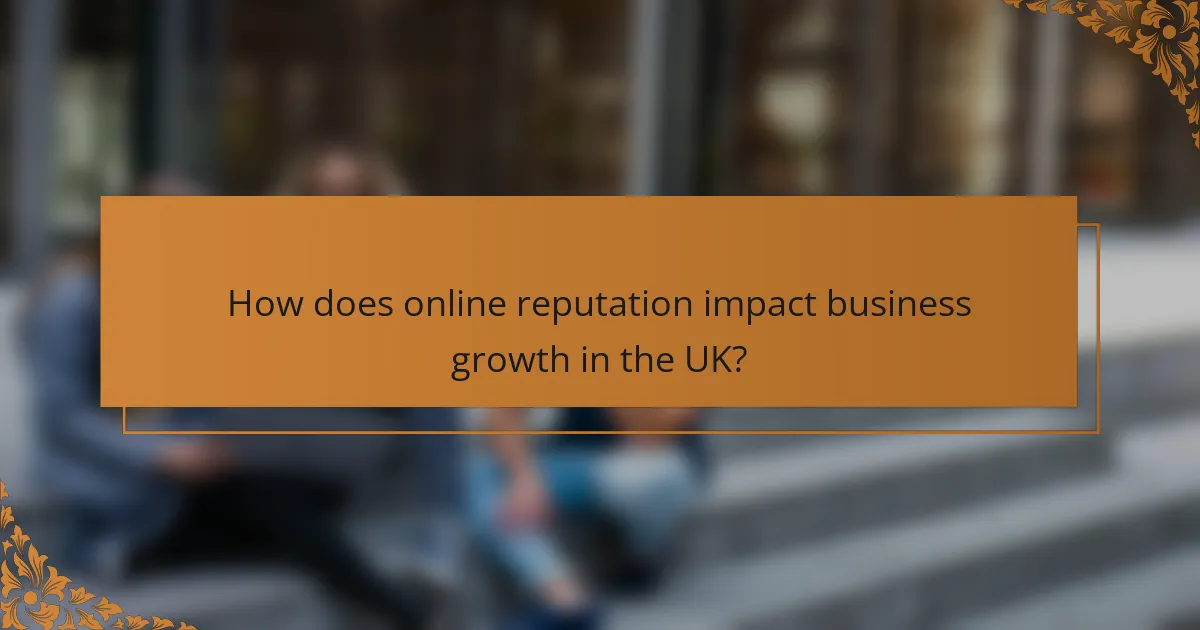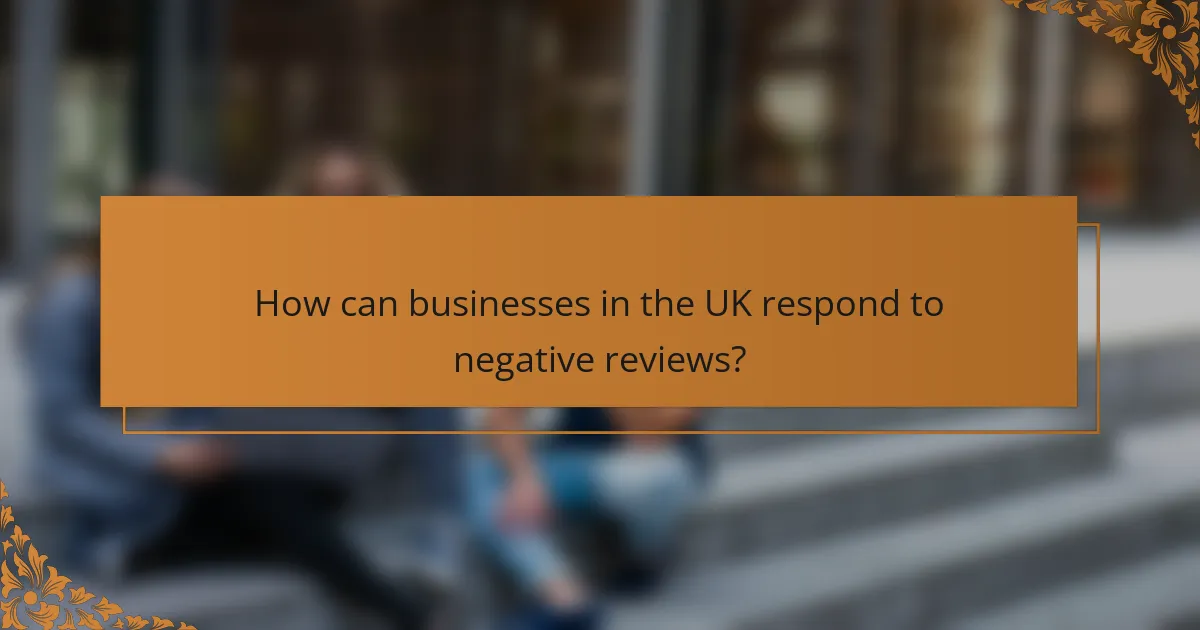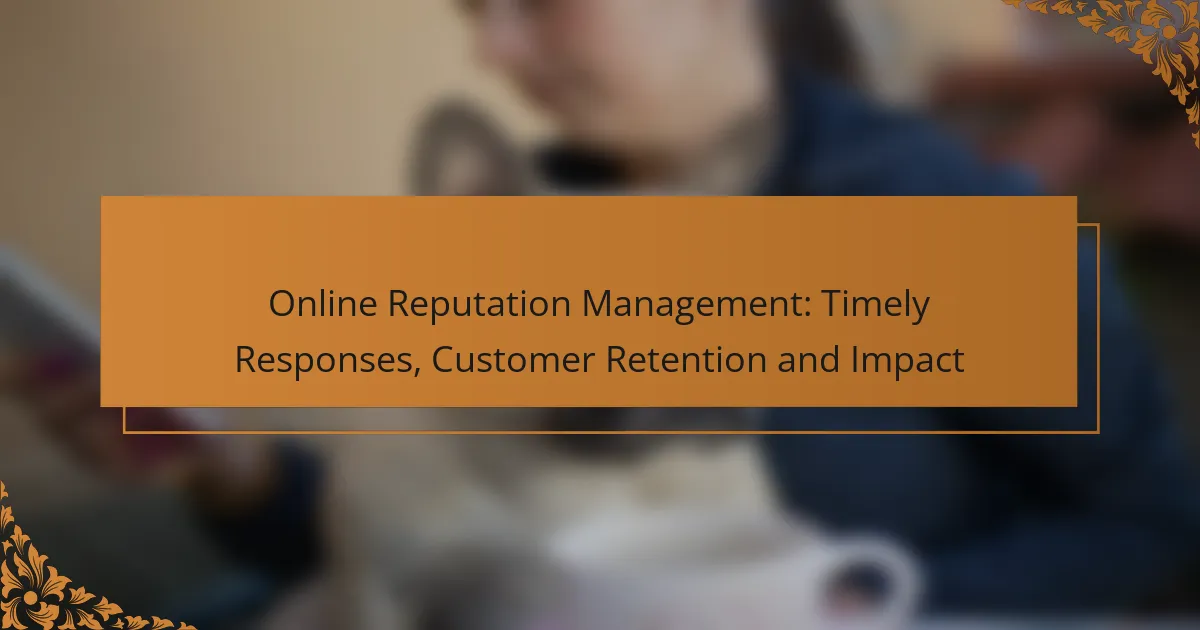Online reputation management is essential for businesses in the UK, as timely responses to customer inquiries can significantly shape perceptions and enhance brand image. By actively engaging with customers and addressing their concerns, companies can not only mitigate negative feedback but also foster loyalty and encourage repeat business. Ultimately, a strong online reputation plays a crucial role in driving growth and increasing revenue.

How can timely responses improve online reputation management in the UK?
Timely responses are crucial for effective online reputation management in the UK as they directly influence customer perceptions and brand image. Quick replies to customer inquiries and complaints can mitigate negative feedback and foster a positive reputation.
Faster resolution of customer complaints
Responding promptly to customer complaints allows businesses to resolve issues quickly, reducing the likelihood of negative reviews. For example, addressing a delivery delay within a few hours can prevent customers from airing grievances on social media or review platforms.
To ensure faster resolutions, companies should implement a streamlined communication system that prioritizes urgent queries. Utilizing chatbots for initial responses can also help in managing customer expectations while human agents handle more complex issues.
Increased customer satisfaction rates
Timely responses significantly boost customer satisfaction rates, as customers feel valued when their concerns are acknowledged quickly. Research indicates that customers are more likely to remain loyal to brands that respond within a few hours rather than days.
To enhance satisfaction, businesses should aim for response times of under 24 hours for emails and even quicker for social media interactions. Regularly monitoring feedback channels can help identify areas for improvement in response times.
Enhanced brand loyalty
When customers receive timely responses, they are more likely to develop trust and loyalty towards the brand. This loyalty can translate into repeat purchases and positive word-of-mouth recommendations, which are invaluable for reputation management.
To cultivate loyalty, businesses should not only respond quickly but also personalize their interactions. Acknowledging previous purchases or specific customer preferences can make responses feel more genuine and foster a deeper connection with the brand.

What are effective strategies for customer retention through reputation management?
Effective strategies for customer retention through reputation management focus on building trust and engagement with customers. By actively managing your online reputation, you can foster loyalty and encourage repeat business.
Personalized customer engagement
Personalized customer engagement involves tailoring interactions to meet individual customer needs and preferences. This can include addressing customers by name in communications, recommending products based on past purchases, and responding to inquiries in a timely manner.
Utilizing customer data to create targeted marketing campaigns can significantly enhance engagement. For example, sending personalized emails with special offers can increase conversion rates and strengthen customer relationships.
Proactive reputation monitoring
Proactive reputation monitoring means regularly checking online reviews, social media mentions, and other feedback channels to stay informed about public perception. This allows businesses to address potential issues before they escalate and respond to customer concerns promptly.
Setting up alerts for brand mentions can streamline this process. Tools like Google Alerts or social media monitoring software can help you track your reputation in real-time, enabling swift action when necessary.
Utilizing customer feedback
Utilizing customer feedback is crucial for understanding customer satisfaction and areas for improvement. Encourage customers to leave reviews and provide feedback through surveys or follow-up emails after purchases.
Analyzing this feedback can reveal trends and insights that inform product development and service enhancements. Regularly implementing changes based on customer suggestions shows that you value their opinions, which can boost loyalty and retention.

How does online reputation impact business growth in the UK?
Online reputation significantly influences business growth in the UK by shaping customer perceptions and driving sales. A positive reputation can lead to increased customer loyalty and higher revenue, while a negative one can deter potential clients and hinder expansion.
Influence on purchasing decisions
Consumers often rely on online reviews and ratings when making purchasing decisions. In the UK, a substantial percentage of shoppers consult reviews before buying, making a strong online reputation crucial for attracting customers.
Businesses should actively manage their online presence by encouraging satisfied customers to leave positive feedback. This can enhance visibility and credibility, ultimately influencing potential buyers to choose their products or services over competitors.
Effect on search engine rankings
A business’s online reputation directly affects its search engine rankings. Search engines like Google consider factors such as reviews, ratings, and overall sentiment when determining a site’s authority and relevance.
To improve search visibility, companies should focus on generating positive customer feedback and addressing negative reviews promptly. This proactive approach can enhance their ranking on search results, making it easier for potential customers to find them.
Impact on customer trust
Trust is a critical factor in customer retention, and online reputation plays a key role in establishing it. In the UK, consumers are more likely to engage with brands that have a strong, positive online presence.
Businesses can build trust by consistently delivering quality products and services, responding to customer inquiries, and transparently addressing any issues. This not only fosters loyalty but also encourages word-of-mouth referrals, further enhancing growth potential.

What tools can assist with online reputation management?
Several tools can effectively assist with online reputation management by monitoring mentions, managing reviews, and analyzing social media interactions. Utilizing these tools can help businesses respond promptly to customer feedback and maintain a positive image.
Google Alerts for monitoring mentions
Google Alerts is a free tool that allows businesses to monitor their online presence by sending notifications whenever their brand is mentioned across the web. Setting up alerts for specific keywords related to your business can help you stay informed about customer sentiments and emerging issues.
To use Google Alerts effectively, create alerts for variations of your brand name, key products, and even competitors. This proactive approach enables you to address potential reputation threats before they escalate.
Reputation management software like Reputation.com
Reputation management software, such as Reputation.com, provides comprehensive solutions for monitoring and improving your online reputation. These platforms typically offer features like review management, sentiment analysis, and reporting tools to track your brand’s health over time.
When selecting reputation management software, consider factors like ease of use, integration capabilities with other tools, and pricing structures. Many options offer tiered pricing based on the features you need, so assess your specific requirements before committing.
Social media management tools like Hootsuite
Social media management tools, such as Hootsuite, allow businesses to manage their social media presence effectively. These tools enable you to schedule posts, monitor engagement, and respond to customer inquiries across multiple platforms from a single dashboard.
Using a social media management tool can streamline your online reputation efforts by ensuring timely responses to customer comments and reviews. Look for features like analytics and reporting to measure the impact of your social media strategies on your overall reputation.

What are the key metrics for measuring online reputation?
The key metrics for measuring online reputation include Net Promoter Score (NPS), Customer Satisfaction Score (CSAT), and online review ratings. These metrics provide insights into customer perceptions and experiences, which are crucial for maintaining a positive reputation.
Net Promoter Score (NPS)
Net Promoter Score (NPS) gauges customer loyalty by asking how likely customers are to recommend a business to others. Responses are typically scored on a scale from 0 to 10, allowing businesses to categorize customers as promoters, passives, or detractors.
A high NPS indicates strong customer loyalty, while a low score suggests areas needing improvement. Regularly measuring NPS can help businesses track changes in customer sentiment over time and identify specific issues that may affect reputation.
Customer satisfaction score (CSAT)
Customer Satisfaction Score (CSAT) measures how satisfied customers are with a specific interaction or overall experience. It is usually determined through surveys that ask customers to rate their satisfaction on a scale, often from 1 to 5 or 1 to 10.
CSAT scores provide immediate feedback on customer experiences, helping businesses pinpoint strengths and weaknesses. Aiming for a CSAT score above 80% is generally considered a good benchmark for customer satisfaction.
Online review ratings
Online review ratings reflect customer opinions on platforms like Google, Yelp, or Trustpilot. These ratings typically range from one to five stars and significantly influence potential customers’ perceptions and decisions.
Maintaining a high average rating is essential for a positive online reputation. Businesses should actively manage their online reviews by encouraging satisfied customers to leave feedback and addressing negative reviews promptly and professionally.

How can businesses in the UK respond to negative reviews?
Businesses in the UK can effectively respond to negative reviews by addressing the issues quickly, offering public solutions, and encouraging satisfied customers to leave positive feedback. Timely and thoughtful responses can help mitigate damage to reputation and foster customer loyalty.
Addressing issues promptly
Responding to negative reviews within a few hours or days shows customers that their concerns are taken seriously. Quick responses can prevent further escalation and demonstrate a commitment to customer satisfaction.
Consider setting up alerts for new reviews to ensure timely engagement. Aim to respond to reviews within 24 hours to maintain a positive brand image.
Offering solutions publicly
When addressing negative feedback, provide clear solutions or steps you are taking to resolve the issue. This not only helps the dissatisfied customer but also shows potential customers that you are proactive and care about service quality.
For example, if a customer complains about a product defect, publicly acknowledge the issue and offer a replacement or refund. This transparency can enhance trust in your brand.
Encouraging positive reviews
After resolving issues, encourage satisfied customers to leave positive reviews. This can help balance out negative feedback and improve your overall rating.
Consider following up with customers via email or social media after a purchase, asking for their feedback and providing links to review platforms. Offering small incentives, like discounts on future purchases, can also motivate customers to share their positive experiences.
